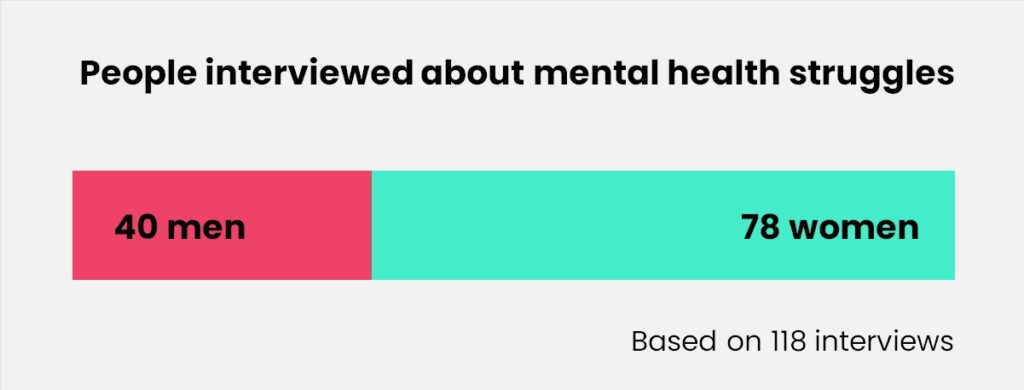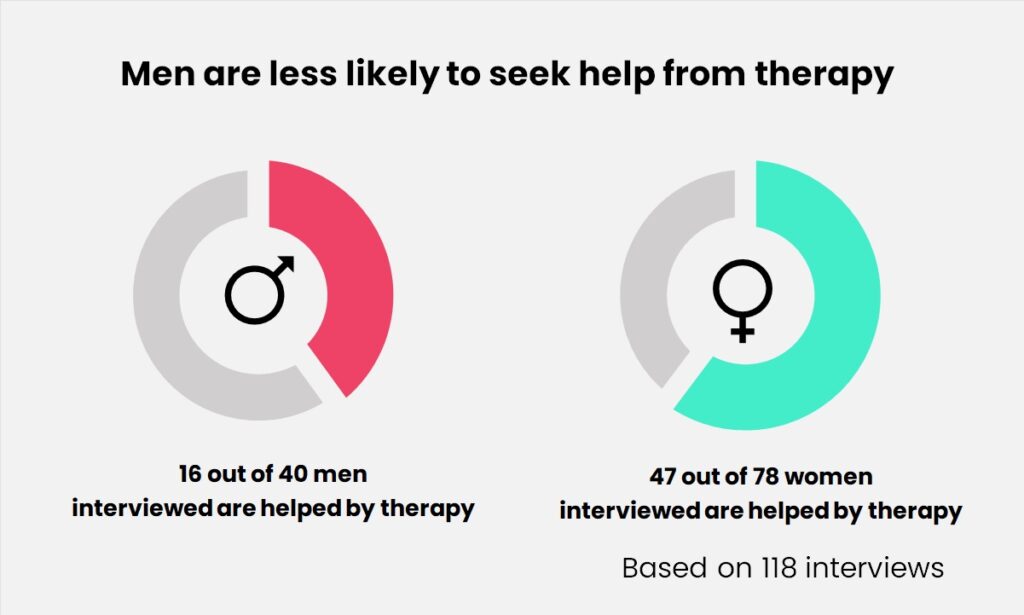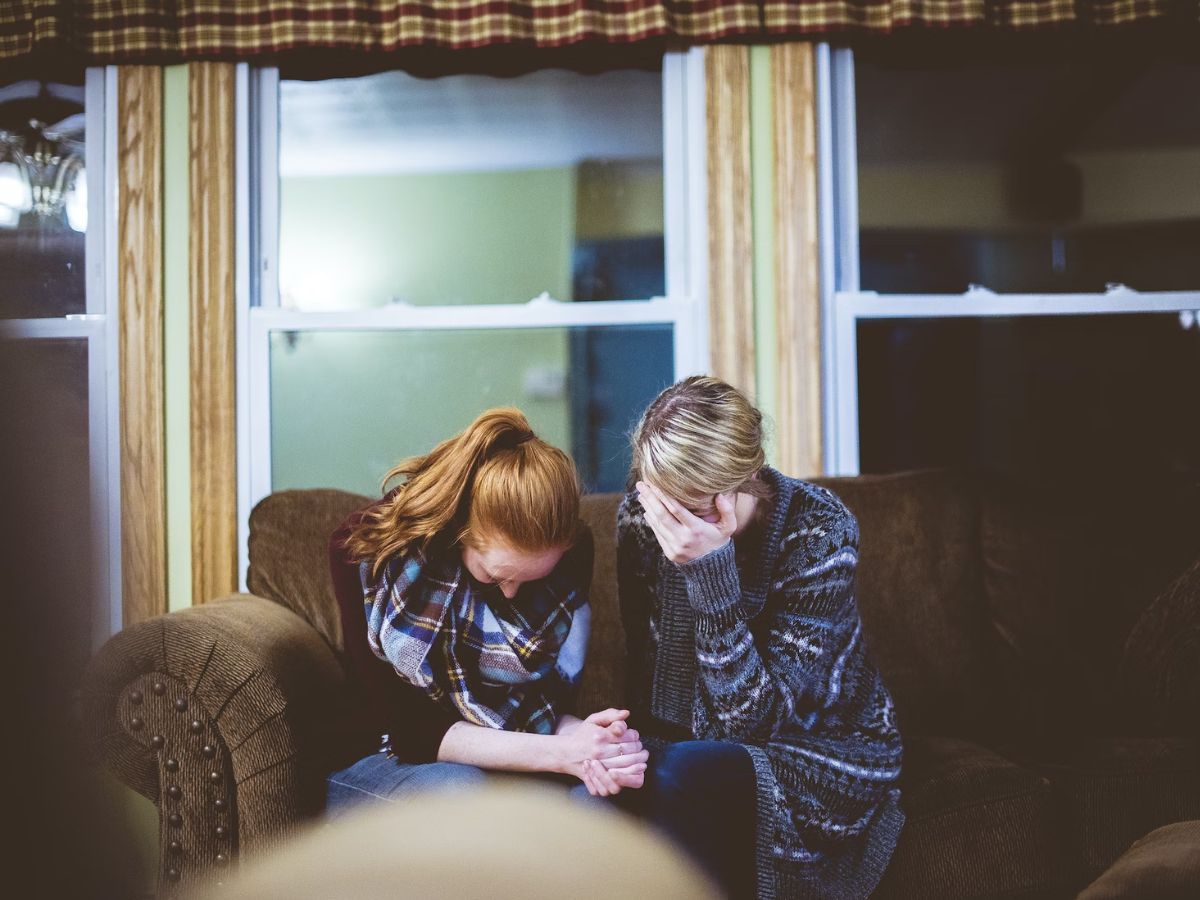I’ve now interviewed 118 persons about mental health issues. In these conversations, these people have opened up about some of the most vulnerable topics, including (sexual) abuse, psychosis, suicidal ideation, and depression.
Looking back at these stories, something in particular strikes me: 78 of these open interviews were with women. That comes down to 2 out of every 3. It didn’t take long before I found myself deep inside a rabbit hole about the gender gap in mental health issues. In this article, I’ll provide a closer look into the data.
About this data: Back in 2021, we surveyed 5,521 people and found that almost 90% of people struggle with mental health issues. These results led us to start publishing interviews with people struggling with issues of mental health. Within a year, we published over 100 interviews and we are now sharing all the data behind these interviews here on Tracking Happiness.
The data from 118 interviews on mental health
From my analysis of 118 detailed interviews, there are some striking differences between genders in their mental health struggles.
Here are some key statistics:
1. I’ve interviewed twice as many women as men
This is the first big hint of the gender gap in mental health.

Even though my interview process is not biased towards a single gender, I’ve ended up interviewing over twice as many women as men.
2. Men are more prone to struggle with suicidal ideation, addiction, and PTSD
Of the 40 men that I’ve interviewed, their most frequent struggles are:
- Depression (25)
- Anxiety (21)
- Childhood trauma (7)
- Suicidal ideation (7)
- Addiction (7)
- PTSD (6)
- Stress (5)
- Grief (3)
Even though depression tops the list of struggles for these men, the other sex struggled with depression at a roughly similar rate.
The struggles that stood out for men are suicidal ideation, addiction, and PTSD. Based on my limited data, men are much more likely to struggle with these issues.
3. Women are more prone to grief, eating disorders and panic attacks
As for women, they struggle most with:
- Anxiety (49)
- Depression (40)
- Childhood trauma (16)
- Grief (13)
- Stress (13)
- Panic attacks (12)
- Eating disorder (10)
- Suicidal ideation (10)
I’ve again bolded the struggles that I encountered more frequently in my interviews with women.
4. Men are less likely to seek help from therapy
Another thing that stood out in this data is that men are much less likely to seek professional help. Less than 50% of the men I interviewed found help in therapy, whereas this percentage is significantly higher for women.

How are these differences explained?
So, what causes these differences between genders?
I won’t pretend to know all the reasons, and frankly, I think no single person can know all of them for sure.
What I do know is that there are many studies doing a great job of exploring the gender gap in mental health.
For example, studies have shown that hormonal changes play a role in mental health. Women experience specific life events related to hormonal changes, such as menstrual cycles, pregnancy, and menopause, which can affect their mental health. For one, Premenstrual Syndrome (PMS) can cause emotional turmoil and big mood swings, whereas the big hormonal changes of giving birth can cause Postpartum Depression.
(Some women I interviewed struggled with this.)
But there are also many social differences between men and women.
Women often face unique stressors related to societal expectations, gender roles, and experiences of discrimination or violence, which can impact their mental health. One example is the societal expectation that it’s a woman’s duty to mother children.
Our writer Ali has written a great article on this topic, and it goes into the impact that this societal mechanism has on women.
Furthermore, this study found that assaulted women were almost three times more likely to have symptoms consistent with major depression and were more than two times more likely to have elevated anxiety.
On the other hand, men also face some issues on their own. This study found that men are generally more prone to engage in risk-taking behaviors. This is linked to a higher likelihood of drug use and alcohol abuse.
This can be further influenced by societal norms and expectations surrounding masculinity. In this study published in Frontiers, it was said that “men’s help-seeking behavior was negatively affected by internalized masculine norms”.
Do women struggle more with mental health issues?
So, there are plenty of reasons that explain the differences in mental health struggles between men and women.
But what about the higher frequency of women in my list of interviews? How come I’ve interviewed nearly twice as many women so far?
My idea is that women are generally better able to manage their emotions. Men are often taught from a young age that being emotionally vulnerable is something to be avoided. Showing your emotions is perceived as showing weakness.
In that sense, it’s easy to see why men are less likely to accept being interviewed about their struggles with mental health.
On the other hand, women are generally more emotionally intelligent than men. As a result, they are more aware of the benefits of being vulnerable, and being interviewed about mental health struggles isn’t as frightening to them.
Wrapping up
This gender gap in mental health struggles is extremely complex and nuanced. With so many cultural, societal, and biological differences between men and women, it’s impossible to cover it all in a single post.
However, I hope by now you’ll agree with me on one thing:
Even though I’ve interviewed twice as many women as men, that doesn’t mean that women struggle more with their mental health. I think it’s the opposite, actually: men might struggle more but are simply less willing to talk about it!
Like this article? Let me know in the comments below!
Want more like this? Keep an eye on the blog as I’m publishing more data-driven insights like these in the future!
Want to help destigmatize mental health issues with your story? I would love to publish your interview and have a positive impact on the world together. Learn more here.

